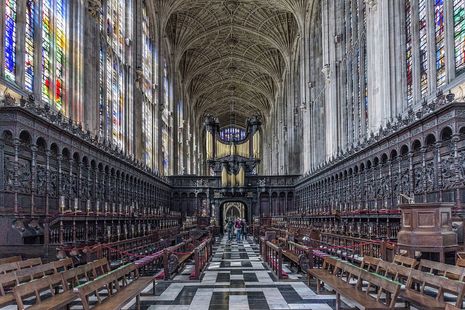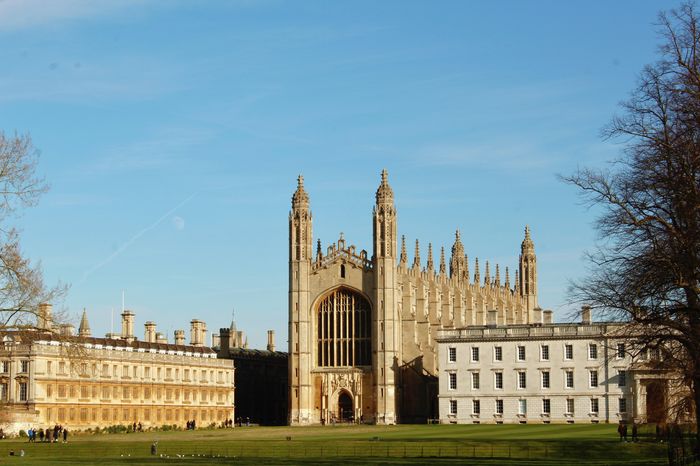Debating King’s solar panel plan is pointless and tiresome
Why are crucial environmental changes harder than they need to be?

It’s rare that I go a day without walking past King’s College Chapel. Postcards and university prospectuses swim with its spires, and walking tours begin at its doors as hordes of camera-bearing tourists crowd around for their perfect Cambridge snap. Towering over the city both literally and metaphorically, the chapel is about as Cambridge as it gets.
In scandalous news, last week Cambridge City Council approved a planning proposal for installing 492 solar panels on the roof of the chapel. “Call the police! Call the porters!” I hear you yell in outrage. Our beloved chapel, defiled by the environmentalist agenda?
Well, that’s what Historic England had to say, warning of irreparable “damage [to] the architectural character and interest of the building”. Michael Proctor, the King’s Provost, made sure to quickly redress these concerns: “As the Planning Committee noted, the panels will have only a very minimal impact on the visual appearance of the Chapel … we are inherently aware of the duty we have to protect the Chapel as a building of exceptional significance.”
The backlash to the planned renovations of the chapel has been blown predictably out of proportion, despite other historical places of worship, including cathedrals, having successfully undertaken similar ventures recently, and forecasts that the solar panels will reduce annual CO2 emissions by over 27,000 kg, generating enough energy to power the chapel with surplus.
“If we refuse to sacrifice anything then we’re not making any change at all.”
My question to you: when will environmental policies stop needing to justify themselves? With every climate change mitigation measure (and believe me, as JCR Green Officer, I’ve seen a lot of failed attempts) comes relentless backlash and questioning. But how will this impact X? How can we afford Y? Is it really necessary? Remember the ferocious resistance to Cambridge divesting from the fossil fuel industry? Despite the backing of rigorous evidence, environmental policies are swamped by a sea of doubt that consistently generates U-turns and cutbacks. Just look at the tragic (non) state of climate change on the cabinet’s agenda. The focus is always on what we must sacrifice, rather than on the gain, because cutting carbon does not tick the box of short term “big win” which local and national governing bodies seek.
Credit is due here to King’s College and Cambridge City Council for pushing forward this plan for the chapel despite fierce objections. However, I can only wish for a day when policies like this aren’t branded as radical and threatening. Of course the building is of historic importance, and the college do not dispute that. If we refuse to sacrifice anything to implement essential climate change preventative policies, regulations, frameworks and laws, then we’re not making any change at all.
There are resounding parallels between this example of University level policymaking and national government. In 2018, the “yellow vests” protestors in France campaigned against a fuel tax rise. Macron relented and U-turned. Concerns over cost prompted Australia to abolish its carbon pricing scheme in 2014. Just last Saturday, Slough Borough Council opposed plans to expand London’s ultra-low emission zone, again using a cost-of-living argument. Let’s not get started on the Greater Cambridge Partnership’s similarly controversial plan for a Sustainable Travel Zone…
I’m by no means suggesting that environmental policymaking is beyond scrutiny, or that it’s always perfect. However, it faces a unique breed of backlash which cannot abide sacrifice. Everything is too expensive, too outlandishly different, too solar-panel-on-roof visible. This argument disregards that change-making has got to break rules – and perhaps break a few roof tiles – if it is to be truly innovative. It’s hypocritical to invoke the very cost-of-living crisis your government is causing to oppose the climate change policies, a favourite hobby of the Tory Net Zero Scrutiny Group: solving one crisis cannot prohibit facing the other.
To future freshers: I’m sorry you won’t get to see the historic tin roof of King’s College Chapel, or if a stray solar panel creeps into your vision. Eyesores weren’t exactly a priority during the industrial revolution. Or, more to the point, they weren’t considered during Covid-19 and World War Two. The climate crisis is just as urgent: it’s about time we got on with solving it and sucked up the reality that progress sometimes causes discomfort.
 Features / Should I stay or should I go? Cambridge students and alumni reflect on how their memories stay with them15 December 2025
Features / Should I stay or should I go? Cambridge students and alumni reflect on how their memories stay with them15 December 2025 News / Cambridge study finds students learn better with notes than AI13 December 2025
News / Cambridge study finds students learn better with notes than AI13 December 2025 News / Uni Scout and Guide Club affirms trans inclusion 12 December 2025
News / Uni Scout and Guide Club affirms trans inclusion 12 December 2025 Comment / The magic of an eight-week term15 December 2025
Comment / The magic of an eight-week term15 December 2025 News / Cambridge Vet School gets lifeline year to stay accredited28 November 2025
News / Cambridge Vet School gets lifeline year to stay accredited28 November 2025









